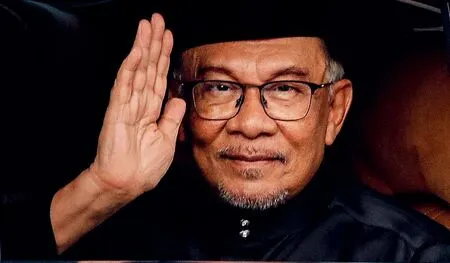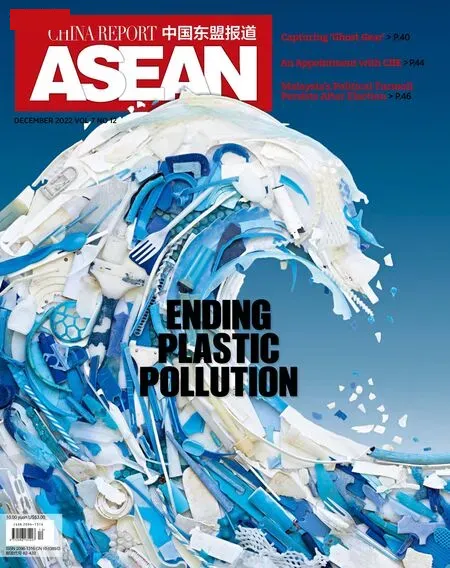Malaysia’s Political Turmoil Persists After Election
2023-01-18ByLuoYongkun
By Luo Yongkun

Anwar Ibrahim on his way to the National Palace in Kuala Lumpur to be sworn in as the new prime minister of Malaysia on November 24, 2022. (XINHUA)
Anwar Ibrahim, leader of the Alliance of Hope and the People’s Justice Party, was sworn in as the 10th prime minister of Malaysia on November 24, 2022, at the National Palace.
Anwar’s election as prime minister was the result of multiple compromises that still did not resolve Malaysia’s political turmoil. However, under Anwar’s leadership, Malaysia-China relations are expected to continue growing.
Political Fragmentation
On November 19, the 15th Malaysian general election was held. After the election, the three major alliances of political parties, Alliance of Hope, National Alliance, and National Front, won 82, 73, and 30 seats in Parliament respectively. None won a simple majority of 112 seats to form a government, resulting in a “hung Parliament” for the first time in Malaysian history. The three alliances of political parties are deeply divided with no intention to form a coalition government. The appointment of the new prime minister after the election was delayed.
King Al-Sultan Abdullah Sultan Ahmad Shah then summoned the leaders of major political parties and discussed candidates for the new prime minister with lawmakers, seeking to help to mediate formation of a coalition government. On November 24, under the guidance of the King, the Alliance of Hope, the National Front, and the Sarawak Parties Alliance formed a coalition government. Anwar won the support of a majority of Parliament and became the new prime minister of government.
The situation of a “hung Parliament” in Malaysia was no surprise to those who follow its politics closely. Gradual political fragmentation since the May 2018 general election prompted the emergence of multiple alliances of political parties and scattered votes. At present, apart from the three major political party alliances of the Alliance of Hope, the National Alliance, and National Front, there are other alliances of political parties such as the Homeland Party and the Sarawak Parties Alliance, which won 23 seats in the latest election.
In such circumstances, it is fairly difficult for any coalition of political parties to win a majority in the Parliament. That is the current political reality in Malaysia.
The emergence of multiple alliances of political parties is a result of the division among Malays, which began in 1998, when then-deputy prime minister Anwar was removed from office by Mahathir. Since then, Anwar and his supporters have been involved in the “Reformasi” (“reform” in Malay) political movement. Eventually, Anwar left the United Malays National Organization (UMNO), founded the People’s Justice Party, and became the leader of the Alliance of Hope today.
In 2016, dissatisfied with the rule of the then-Prime Minister Najib, Mahathir, Muhyiddin, and other figures left the UMNO and founded the Malaysian United Indigenous Party, which would become the major force of the National Alliance today. In February 2020, Mahathir fell out with Muhyiddin and left the Malaysian United Indigenous Party. He founded the Homeland Fighters’ Party and established a new alliance of political parties: the Homeland Party.
Hence, the major political parties of the three major alliances of political parties including the Homeland Party were actually divided from the former UMNO.
If the UMNO had not been divided, it would be hard to imagine today’s three major alliances of political parties and the Homeland Party.
After Anwar has been sworn in, the Malaysian government led by the Alliance of Hope is expected to advance Malaysia’s current foreign policy steadily.
Anwar’s Challenges
Although Anwar has been sworn in as prime minister, the complex domestic political environment means he will have to focus on integration of the fragmented political alliances. The administration of his new government is sure to encounter major difficulties.
First, Anwar’s ruling coalition is not firm. Although the coalition is led by the Alliance of Hope, the withdrawal of any political party or alliance of political parties, including the National Front, will lead to the collapse of Anwar’s government. To be more specific, although the National Front is the weakest among the three alliances with only 30 seats in Parliament, it is a key supporter of Anwar’s administration. It would not be at a disadvantage in a power struggle with Anwar. In the future, the Anwar government will be encumbered by the National Front in the appointment of some key positions and the promulgation of some policies. In this regard, the jockeying between the National Front and the Alliance of Hope may have just begun.
Second, the opposition led by the National Alliance will definitely continue to confront the Alliance of Hope in Parliament. Dividing the ruling coalition will be the major means for the National Alliance to stop Alliance of Hope from passing any policy.
During the Sheraton coup week in February 2020, the withdrawal of the Malaysian United Indigenous Party from the Alliance of Hope led to the collapse of the government of the Alliance of Hope. That scene must still be fresh in Anwar’s mind. Shortly after he was sworn in as prime minister, National Alliance leader Muhyiddin requested Anwar to prove he won a majority in Parliament, raising the curtain on what is likely to be lengthy strategic maneuvering against the Alliance of Hope. Anwar will test lawmakers’ support for his leadership with a confidence vote in Parliament on December 19, which will be the first threshold he has to cross.
Malaysia-China Relations
After Anwar has been sworn in, the Malaysian government led by the Alliance of Hope is expected to advance Malaysia’s current foreign policy steadily. Malaysia-China relations are expected to maintain sound momentum of steady development.
The Alliance of Hope has shown a positive attitude towards developing relations with China. The Alliance of Hope government took office in May 2018. Although the prime minister at that time was Mahathir, the Alliance of Hope, under Anwar’s leadership, was a major leading force in Parliament. In less than two years of governance of the Alliance of Hope, China-Malaysia relations developed steadily in general, including the establishment of a bilateral consultation mechanism for maritime issues.
In October 2018, Anwar visited China. At Renmin University of China, he delivered a keynote speech on the rule of law in Malaysia and the future of Malaysia-China relations. “Malaysia considers China a major strategic partner,” he said. “We have been very clear that the country wants to enhance investment, trade, economic, and cultural relations with China.” He believed that the two countries should strengthen cooperation to boost China’s exports while benefiting Malaysia.
After more than 40 years of development, Malaysia-China relations have entered a track of sound and mature growth. The two countries have maintained increasingly close relations in economics, trade, politics, culture, and security, fostering more political mutual trust, strategic consensus, and willingness to engage in further cooperation. Bilateral cooperation mechanisms including the Malaysia-China High Level Committee, the Malaysia-China Strategic Consultation, the Malaysia-China Strategic Defense Consultation, and the Bilateral Consultation for Maritime Issues will guide the development of relations. All signs point to Malaysia-China relations continuing to move forward steadily under Anwar’s leadership.
杂志排行
China Report Asean的其它文章
- Capturing ‘Ghost Gear’Discarded fishing gear continues to “fish” as the ocean’s silent killer
- Ending Plastic Pollution
- Embracing The ‘Asian Moment’
- CELEBRATING THE 55TH ANNIVERSARY OF ASEAN China and ASEAN pursue common development through solidarity and mutual assistance
- CHINA’S NEW ECONOMY TAKES OFF The goal is to build a modern socialist economy with Chinese characteristics
- A Century of Chinese Animation Drawing a path with Chinese characteristics
